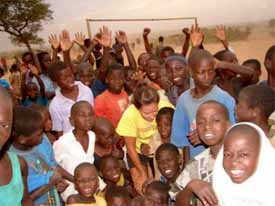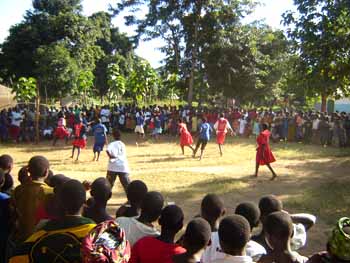 Source: Family Health International
Source: Family Health International
Family Health International (FHI) is teaming up with Grassroot Soccer (GRS), a US-based nonprofit organization that uses the popularity of soccer to help reduce the transmission of HIV. In collaboration with GRS, FHI will build the capacity of three Tanzanian organizations to adapt and implement the GRS curriculum, which uses soccer-based activities to teach young people life and coping skills, resiliency, and good health practices.
FHI will work with GRS to adapt, translate, pretest, and reproduce the GRS curriculum for use with Tanzanian youth. By taking part in a series of interactive games, activities, and discussions, participants in these unique programs will gain understanding of core messages related to HIV/AIDS and have the opportunity to practice the skills necessary for sustainable behavior change.
The curriculum will focus on topics that include:
- making healthy decisions
- avoiding risks
- building support networks
- reducing stigma and discrimination
- increasing knowledge about HIV testing and treatment
- addressing gender issues
- assessing values
 GRS shares FHI’s commitment to working with schools and local sports, faith-based, and civil society organizations to help reduce the transmission of HIV. Grassroot Soccer’s programming model is based on providing local organizations with the support, training, and capacity building they need to implement grassroots-level interventions and on empowering local role models—including professional soccer players, youth sport coaches, and teachers—to educate the youth in their communities.
GRS shares FHI’s commitment to working with schools and local sports, faith-based, and civil society organizations to help reduce the transmission of HIV. Grassroot Soccer’s programming model is based on providing local organizations with the support, training, and capacity building they need to implement grassroots-level interventions and on empowering local role models—including professional soccer players, youth sport coaches, and teachers—to educate the youth in their communities.
Young people who participate in the program will take part in a graduation ceremony and receive a certificate, but their involvement will not end there. GRS will support graduates in becoming peer educators who will share the knowledge they have gained with their family, friends, and communities. Graduates will be provided with tools including Extra Time Magazine, an engaging publication that features interviews with the world’s top soccer stars and reviews important topics covered in the GRS curriculum.
Grassroot Soccer programs have already proven highly successful in reaching African youth. Independent evaluations of the program conducted by the Children’s Health Council and consultants from The Population Council and Harvard School of Public Health have shown the GRS curriculum to be effective in improving participants’ knowledge, attitudes, resiliency skills, and perceived social support related to HIV/AIDS. The partnership between GRS and FHI in Tanzania will graduate at least 1,800 Tanzanian youth and reach more than 9,000 people through community education and outreach.
